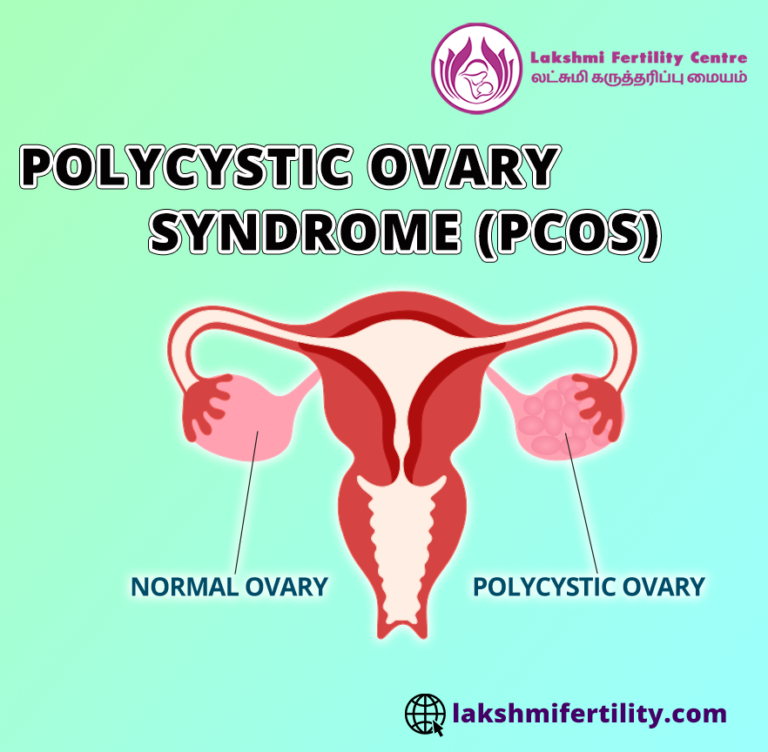POLYCYSTIC OVARY SYNDROME
Polycystic ovary syndrome (PCOS) is a common hormonal disorder that affects people with ovaries, typically during their reproductive years. PCOS is characterized by a combination of symptoms, and it can have various implications for a person’s health. It’s important to note that PCOS itself is not a “disease” but rather a syndrome—a collection of symptoms that tend to occur together.

-
IRREGULAR MENSTRUAL CYCLES:
One of the hallmark features of PCOS is irregular menstrual cycles. This can manifest as irregular periods, infrequent periods, or an absence of menstruation.
-
OVULATORY DYSFUNCTION:
Many individuals with PCOS experience ovulatory dysfunction, meaning that they may not ovulate regularly. This can contribute to fertility issues.
-
HYPERANDROGENISM:
Elevated levels of androgens (male hormones) are common in individuals with PCOS. This can lead to symptoms such as acne, hirsutism (excess hair growth in a male pattern), and male-pattern baldness.
-
POLYCYCSTIC OVARIES:
Enlarged ovaries with small fluid-filled sacs (follicles or cysts) around the eggs may be visible on ultrasound. However, not all individuals with PCOS have polycystic ovaries, and the presence of cysts alone does not confirm the diagnosis.
-
INSULIN RESISTANCE:
Many individuals with PCOS have insulin resistance, where the body's cells do not respond effectively to insulin. This can lead to elevated insulin levels and an increased risk of type 2 diabetes
-
METABOLIC ISSUES:
Insulin resistance and other metabolic factors associated with PCOS can contribute to an increased risk of metabolic conditions, such as obesity, dyslipidemia, and metabolic syndrome.
-
ENDOMETRIAL HEALTH:
Irregular or absent menstrual cycles can lead to changes in the endometrium (lining of the uterus), increasing the risk of endometrial hyperplasia and, in some cases, endometrial cancer.
-
SLEEP APNEA:
PCOS has been linked to an increased risk of sleep apnea, a condition characterized by pauses in breathing during sleep.
It’s important to approach PCOS holistically, considering both the immediate symptoms and potential long-term health risks. Management of PCOS often involves lifestyle changes, medications to regulate menstrual cycles and address symptoms, and, in some cases, fertility treatments. Additionally, addressing metabolic factors through a healthy diet, regular exercise, and weight management is crucial. Individuals with PCOS should work closely with lakshmi Fertility Centre in Karaikudi providers to develop a personalized treatment plan based on their specific needs and health conditions.
MEDICATION:
-
LIFESTYLE CHANGES:
Diet: Adopting a healthy, balanced diet can help manage weight and improve insulin sensitivity. A diet low in processed sugars and refined carbohydrates is often recommended.
Exercise: Regular physical activity can help regulate menstrual cycles, manage weight, and improve insulin sensitivity. -
WEIGHT MANAGEMENT:
Achieving and maintaining a healthy weight is a key aspect of managing PCOS, especially if overweight or obese. Weight loss can improve insulin sensitivity, regulate menstrual cycles, and reduce symptoms.
-
MEDICATIONS:
Birth Control Pills: Oral contraceptives can regulate menstrual cycles, reduce androgen levels, and improve acne.
Anti-Androgen Medications: Spironolactone and flutamide can help reduce symptoms such as excess hair growth and acne by blocking the effects of androgens.
Metformin: This medication is often prescribed to improve insulin sensitivity and regulate menstrual cycles, especially in individuals with PCOS who have insulin resistance or diabetes. -
FERTILITY MEDICATIONS:
For individuals trying to conceive, fertility medications such as clomiphene or letrozole may be prescribed to induce ovulation.
In Vitro Fertilization (IVF) may be recommended in cases of infertility. -
NUTRITIONAL SUPPLEMENTS:
Some studies suggest that certain supplements like inositol (especially myo-inositol and D-chiro-inositol), vitamin D, and omega-3 fatty acids may have benefits for women with PCOS. However, it's important to consult with a healthcare provider before starting any supplements.
-
SURGERY:
In some cases, surgery may be recommended to address specific symptoms. Ovarian drilling, a laparoscopic procedure, is sometimes performed to improve ovulation.
